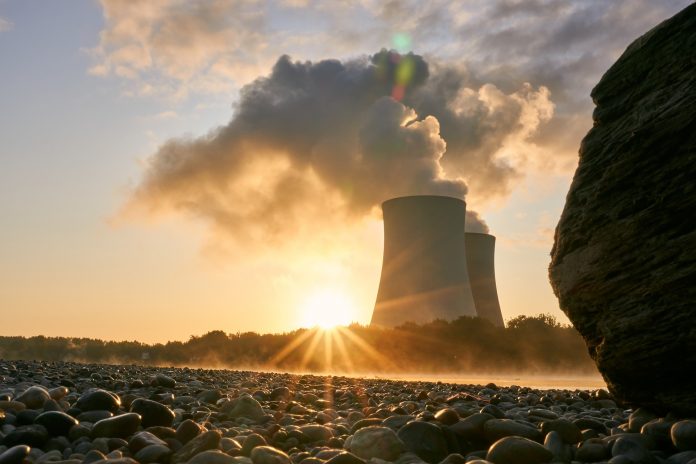The first new nuclear power reactor in the United States in more than 30 years came on online in July 2023 at a plant owned by Georgia Power and operated by Southern Nuclear.
Georgia Power announced the Plant Vogtle Unit 3 came online and began to producing enough electricity to power more than 500,000 homes and businesses in Georgia. Vogtle Unit 3 is the first Westinghouse AP1000 plant in the United States, a new and improved pressurized water reactor with passive safety features and uranium pellets as fuel.
Westinghouse says the “passive” reactor is designed to shut down automatically when an issue is detected, without the operator needing to notice anything wrong first. It can also safely shut down without any working pumps or power. The plant itself is designed with structural redundancies that add further layers of protection.
A second nuclear unit is nearing completion and is scheduled come online in late 2023 or early 2024, according to Georgia Power. That unit will likewise generate enough electricity to power a half-million homes and businesses.
“Largest Generator of Clean Energy”
The first two units at Plant Vogtle have a generating capacity of about 2,430 megawatts of electricity, and Units 3 and 4 will add another 2,234 megawatts.
A Georgia Power press release says that Unit 3 and 4’s additions will make Plant Vogtle the largest clean electricity producing plant in the United States.
“Once all four units are online, the Plant Vogtle site will be the largest generator of clean energy in the nation and support continued growth in Georgia as more industries, businesses and families come to the state,” Georgia Power’s release says.
Nuclear power plants like Plant Vogtle provide reliable, clean, and long-lasting electricity generation, says Kim Greene, chairman, president, and CEO of Georgia Power, in the press release.
“It is important that we make these kinds of long-term investments and see them through so we can continue providing clean, safe, reliable and affordable energy to our 2.7 million customers,” Greene said. “Today’s achievement is a testament to our commitment to doing just that, and it marks the first day of the next 60 to 80 years that Vogtle Unit 3 will serve our customers with clean, reliable energy.”
Reliable Baseload Power
A nuclear power plant generates no emissions regulated by the U.S. Environmental Protection Agency, nor does it produce carbon dioxide. The only air emissions from nuclear plants are water vapor from cooling towers.
Other electricity generation technologies, like wind and solar, also create electricity with no emissions, but they are too intermittent to provide baseload power. Nuclear, on the other hand, can provide baseload energy, says Georgia Power, and already supplies the state with a quarter of their energy needs.
“Nuclear energy is the only zero-emission baseload energy source available today, offering high reliability, and efficient operations around the clock,” the release states. “Nuclear energy currently provides approximately 25% of Georgia Power’s overall energy mix, including the existing units at Plant Vogtle and Georgia’s other nuclear facility at Plant Hatch in Baxley, Ga.”
Plant Hatch was built in the 1970s and has two nuclear power units that produce a combined 1,848 megawatts of electric power.
Added Costs to Customer Bills
Nothing is free, however. The capital costs of Unit 3 will be passed on to electricity customers’ rate base starting in August 2023, says Georgia Power.
“This will add an estimated $5.42 per month, or 3.2% increase, to the typical residential customer’s monthly bill using an average of 1,000 kWh per month,” Georgia Power states. “Any additional increase to rates will be decided on by the Georgia PSC at a later date.”
Linnea Lueken (llueken@heartland.org) is a research fellow with the Arthur B. Robinson Center on Climate and Environmental Policy at The Heartland Institute.


























